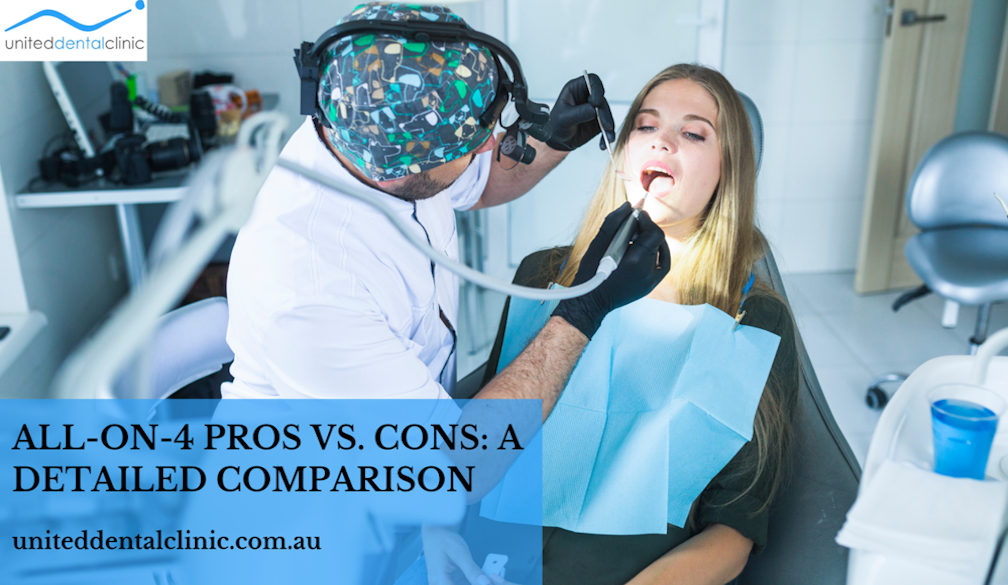All-on-4 Pros Vs. Cons: A Detailed Comparison

Losing teeth affects more than just appearance. Eating becomes difficult. Confidence takes a hit. Social situations feel awkward.
All-on-4 dental implants promise a solution. But like any major dental work, there are trade-offs worth understanding before booking that first appointment at an All-On-4 Treatment Narrabeen clinic.
What All-on-4 Dental Implants Actually Do?
Four implants support a complete dental arch of replacement teeth. That's the basic concept.
The placement matters. Two implants go straight into the front of the jaw, where bone tends to stay thicker.
The back two angles are at roughly 30-45 degrees. This tilted approach makes the most of available bone without needing grafts.
Everything locks into place. The prosthetic teeth attach to these four anchor points and stay there. No adhesives. No slipping during dinner.
People considering All-On-4 Treatment Narrabeen typically have lost most or all teeth in an arch and want something permanent that functions like real teeth.
The All-on-4 Advantages: Why People Choose All-on-4 Dental Implants?
Getting Teeth the Same Day
Traditional implants mean months of waiting. Healing periods stretch out. Temporary solutions fill the gap.
All-on-4 works differently. Surgery happens in the morning. By afternoon, temporary teeth are in place. Patients leave the office with a full smile.
The permanent bridge comes later, after healing. But nobody goes home toothless.
Working Around Bone Loss
Tooth loss leads to bone shrinkage. The jawbone needs stimulation from tooth roots to maintain density.
Many older patients assume they lack sufficient bone for implants. Sometimes they're right, but for traditional implants. But All-on-4 dental implants use those angled back implants to bypass areas where bone has thinned out.
Bone grafting becomes unnecessary in most cases. This is one of the major All-on-4 advantages. Surgery stays simpler. Costs stay lower.
Stability That Changes Meals
Dentures move. Anyone who's worn them knows this. A bite of crusty bread can dislodge them. Corn on the cob becomes off-limits. Even speaking clearly takes practice.
All-on-4 dental implants don't shift. The bite force rivals natural teeth. Steak, apples, popcorn—all back on the menu. Conversations flow naturally without worrying about clicking or slipping.
Longevity Worth Considering
Dentures last 5-7 years before needing replacement. Adjustments happen even sooner. The jaw continues changing shape as bone recedes, making dentures fit poorly over time.
All-on-4 can function for 20+ years. Some patients never need replacement. The implants fuse with bone and stay stable.
Maintenance matters, obviously. But the basic structure endures when properly cared for.
Preserving Facial Structure
Here's something denture wearers notice over time—their face changes shape. The lower third of the face starts looking shorter. Lips lose support. That "sunken" appearance develops.
Bone loss causes this. Without tooth roots, the jaw gradually dissolves away. All-on-4 implants mimic natural tooth roots. They stimulate bone, keeping it from disappearing.
Facial proportions stay more balanced. The ageing process slows down, at least in terms of bone-related changes.
Daily Maintenance That Makes Sense
Dentures require their own routine. Adhesive application. Overnight soaking. Special cleaning tablets. Careful handling to avoid drops.
All-on-4 uses standard oral hygiene with minor adjustments. Brushing twice daily. Flossing with special threaders to get under the bridge. Water flossers help reach tricky spots.
The routine feels familiar. Even patients managing other dental work, like Invisalign treatment Narrabeen find All-on-4 care fits naturally into their existing habits.
The Cons of All-on-4: Where All-on-4 Treatment Narrabeen Might Require a Second Thought?
That Initial Price Shock: All-on-4 cost vs dentures
Looking at the All-on-4 cost vs dentures, the upfront difference is substantial. Not everyone has $25,000 available for dental work.
Understanding: All-on-4 cost vs dentures
|
Option |
Starting Cost |
Expected Lifespan |
Ongoing Expenses |
|
Removable Dentures |
$2,000 - $5,000 |
5-7 years |
Adhesives, relines, replacements |
|
All-on-4 (per arch) |
$20,000 - $30,000 |
20+ years |
Routine cleanings, possible bridge replacement |
Over the decades, All-on-4 dental implants have often cost less overall. Dentures need to be replaced multiple times. Adjustments add up. Adhesive purchases never stop. Still, that initial payment remains a significant barrier.
Payment plans exist. Dental financing can spread costs over years. But the sticker price still makes people pause.
Medical Limitations Apply
Not everyone qualifies. Some conditions make All-on-4 risky or impossible.
Potential disqualifiers:
- Active periodontal disease
- Uncontrolled diabetes
- Heavy smoking (increases failure risk)
- Certain autoimmune conditions
- Inadequate bone in specific areas
- Recent radiation therapy to the jaw
Most issues can be addressed. Gum disease gets treated first. Diabetes gets managed. Smokers might quit or accept higher risks.
But some patients simply aren't good candidates. A thorough exam reveals these limitations before surgery.
Surgery Carries Real Discomfort
Drilling into the jawbone isn't minor. Anesthesia handles pain during the procedure. Afterwards, though, expect swelling. Minor Discomfort lasts several days. Pain medication helps. Ice packs reduce swelling.
Recovery takes about a week before returning to work. Soft foods continue for a month.
The Permanence Factor
Dentures offer flexibility. Uncomfortable? Adjust them. Hate the look? Try different ones. Cost becoming unbearable? Stop wearing them.
All-on-4 allows none of that. Once those implants go in, they stay in. The only person removing them is a dentist with specialised tools.
Digital planning helps visualise results beforehand. Mock-ups show approximate outcomes. But there's no trial period. No returns policy.
When Implants Don't Take
Success rates hover around 95-98%. Excellent odds. But that remaining 2-5% experience failure.
Common failure causes:
- Infection at the implant site
- Insufficient bone integration
- Excessive force from grinding
- Smoking during healing
- Poor oral hygiene post-surgery
Early failures (within months) usually get addressed under warranty. Late failures (after years) mean additional procedures and costs.
Dietary and Lifestyle Adjustments
The first few months require significant changes. Hard foods stay off the menu. Crunchy snacks need to wait. Even chewy foods can stress healing implants.
Nutritional variety in soft diets gets challenging. After healing, most foods are safe again. Grinding teeth at night might require a guard.
Regular dental visits become mandatory. Six-month cleanings aren't optional anymore. Miss too many appointments, and warranty coverage might vanish.
Finding the Right Candidates After Evaluating Pros & Cons of All-on-4
Who Enjoy The Most All-on-4 Advantages
All-on-4 works best for patients who:
- Lost most or all teeth in one or both arches
- Feel frustrated by denture movement and limitations
- Want faster results than traditional implant-per-tooth approaches
- Have reasonable bone density (or mild to moderate loss)
- Maintain good oral hygiene habits
- Don't smoke or are willing to quit
- Have realistic expectations about outcomes
Who Should Consider Alternatives
There are All-on-4 disadvantages. Better options might exist for patients who:
- Have significant health conditions affecting healing
- Can't commit to the required oral hygiene routine
- Expect perfection beyond what's physically possible
- Have severe bone loss requiring extensive grafting
- Face financial constraints without workable payment options
Some situations need different solutions first. Patients with several remaining teeth might explore options like Invisalign treatment in Narrabeen for repositioning.
FAQs?
Does the surgery hurt?
Not during the treatment. Numbing and sedation handle that. Afterwards, yes, but manageably. Pain peaks around day 2-3, then improves steadily.
How long before eating normally?
Soft foods continue for 2-3 months during initial healing. After the final bridge placement, most foods become accessible. Extremely hard items stay off-limits permanently.
What happens if an implant fails?
Early failures usually get replaced under warranty. Late failures require evaluation. Sometimes a single implant can be replaced, sometimes the entire system needs addressing. Insurance coverage varies.
Can bone grafting be avoided entirely?
Usually, yes. That’s one of the pros of All-on-4. The angled implant technique works around most bone loss. Severe cases still occasionally need grafting, but far less commonly than traditional methods.
What about maintenance costs?
Expect regular cleanings every 6 months at standard rates. Occasional adjustments might be needed. After 10-15 years, the prosthetic bridge might require replacement while implants remain functional.
Making the Decision
All-on-4 isn't universally superior to dentures. It's different. Better for some people. Wrong for others. The All-on-4 advantages matter. So do the disadvantages.





